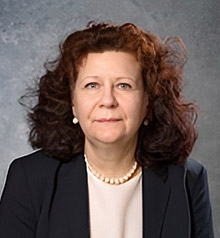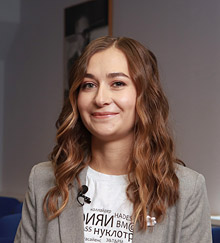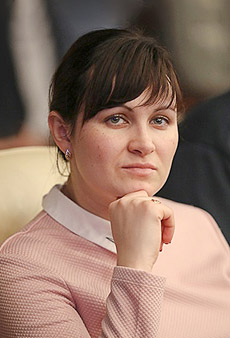
Electronic english version since 2022 |
The newspaper was founded in November 1957
| |
|
Number 9 (4707) |
Women in Science
About favorite job and gender stereotypes
Nobody disputes the contribution of women to science, although this path has always been thorny - it is more necessary to overcome established stereotypes than to engage in experiments and analytics. For example, the world's first female professor of mathematics Sofya Kovalevskaya entered into a fictitious marriage in order to go abroad and enter the University of Berlin and even there, although women were accepted as students, they were prohibited from attending lectures...
Today, any scientific institution is unthinkable without female participation. Routine laboratory work, control over the use of materials, methodological calculations, duty at basic facilities - it's impossible to list everything. The Department of Personnel and Records Management provided us with the following figures.
In total, the percentage of our staff is 37% women. Of these, engineers make up 33%, scientists - 19%, workers - 35%, heads - 24%, office workers - 96%, specialists - 87%. 19% are candidates of science and 6% are doctors of science.
Let's imagine how much necessary and important work women's hands do at the Institute!
Our special correspondent Ksenia MORUNOVA has prepared an article in which women talk about science and themselves.
***
 Alla BOREYKO, LRB Deputy Director for Research
Alla BOREYKO, LRB Deputy Director for Research
The fact that I was born in Dubna has largely predetermined my life path and the subsequent choice of my favorite profession to which I devoted myself. After graduating from the mathematics class at school No.8, I entered MEPhI at the Faculty of Experimental and Theoretical Physics ("T"). At that time, female applicants to MEPhI were recruited into only one faculty - cybernetics. Those who passed the exams brilliantly were offered to choose any department of the institute. During my student years, mostly young people studied at the "T" faculty of MEPhI and there were very few girls. Each student group of 25 people had no more than two or three girls. But this ratio changed greatly when group No.13 was developed, in which out of 300 people in the course, only 10 people were recruited (5 young men and 5 girls) to train specialists in the field of radiation biophysics. And this science, radiation biophysics, completely captivated me.
When I came to study at JINR, a structure was just developing here that later developed into the Laboratory of Radiation Biology. My work in the laboratory was initially related to the investigation of the patterns of recovery of yeast cells after exposure to ionizing radiation. Later, Professor Evgeny Krasavin proposed a task to me that was related to the investigation of the genetic effect of ionizing radiation on bacterial cells. This paper was successfully completed and the results were included into a coherent theory that I defended at Moscow State University in the form of a doctoral dissertation on the topic "Genetic effect of accelerated heavy ions."
Despite the fact that as Deputy Director for Research, I oversee all research areas of the Department of Radiation Biology and Physiology of LRB, my research interests are related to molecular radiobiology. I have been heading the molecular radiobiology sector for many years, in which excellent work has been carried out during this time, very promising, modern molecular techniques have been developed that allow not only to quantitatively determine the patterns of development of genetic damage, but also to visualize these damages. The techniques used helped us to find new approaches to meeting the most current issues in medical and space radiobiology.
***
 Darya PRYAKHINA, researcher at the Department of External Communications and Distributed Information Systems, MLIT
Darya PRYAKHINA, researcher at the Department of External Communications and Distributed Information Systems, MLIT
While studying at the Dubna University, I was always interested in completing tasks with an asterisk and looking for non-standard solutions. My scientific supervisor Nadezhda Aleksandrovna Tokareva was able to fully recognize and reveal these fundamental qualities of the future researcher. It was her to subsequently recommend Vladimir Vasilievich Korenkov to consider my candidacy for meeting the issues at MLIT JINR, that is, she determined my future fate, for which I am very grateful to her! Currently, under the supervision of Vladimir Vasilievich, I work on the development of digital twins to address issues of control and development of distributed centres for accumulation, storage and processing of data.
I am a programmer by training; according to statistics, this field is dominated by men, so there is a stereotype that it is a "male" profession. But nevertheless, the world's first programme was compiled by a woman, mathematician Ada Lovelace - isn't that a success?! She is definitely worthy of admiration and respect. Science as a whole cannot be divided into "male" and "female". I have a strong belief that the choice of area of activity does not depend on gender, but on the mindset, character, interests...
I wish women scientists to remember that science opens up great prospects if you do your work with love. In no case should we be afraid of difficulties; only in searching for answers to complex questions do we develop and increase our knowledge. And since brilliant solutions do not come immediately, I wish you perseverance! Let everything you do bring joy, then there will be new discoveries and achievements!
***
 Elizaveta BUSHMINA, trainee researcher at the Department of Physics at the Nuclotron-NICA accelerator complex, VBLHEP
Elizaveta BUSHMINA, trainee researcher at the Department of Physics at the Nuclotron-NICA accelerator complex, VBLHEP
Science has a key place in my life, as it surrounds me and all of us, everywhere: gadgets that we constantly use; the roads on which we drive cars; lighting available at night... All this and much more are the fruits of science, invention and this cannot but inspire!
I remember that in one of the physics lessons at school, when we were told about how the world works, about atoms, nuclei and other particles, I was so impressed by this information: in a sense, it turned my serene childhood world upside down! What you knew before is not enough to understand some processes and you think about how complex and ambiguous everything is...
Most of my research has been dedicated to the interaction of radiation with plastic materials for problems in nuclear medicine and medical physics and at the moment, I still work on this topic as well. But currently, I devote more and more time to developing diagnostic devices for particle beams generated by accelerators. There are many facilities with their own characteristics and diagnostic systems developed for them, but the development of new accelerators requires new approaches or modernization of current techniques for determining beam parameters. And it's very exciting!
I am proud of the internationality of science, the fact that there are no borders or restrictions for it. I am proud of the opportunities that open up for you as a scientist: the key to understanding the structure of the world is in your hands - and this is science.
***
 Vasilisa LENIVENKO, researcher at the Department of Hadron Physics, VBLHEP
Vasilisa LENIVENKO, researcher at the Department of Hadron Physics, VBLHEP
I developed a desire to know how the world works back in school. And when physics started that as you know, explains the mechanisms of the world, I realized that I wanted to devote my life to this science. At university, I liked topics related to colliders. You can't imagine the level of happiness of a young graduate when the opportunity arose to pass an interview on this topic and to be involved in studying the properties of the particles that make up the whole world! A very important point for me in science is that everything we do today will serve future generations and help humanity. Therefore, even a small contribution in this industry is important and very necessary.
Currently, the experiment I work on goes through the stage of a "young" experiment, where I develop software for processing experimental data. This is difficult and painstaking work but it is necessary for future discoveries at the BM@N experiment and the entire NICA collider.
Is it more difficult for a woman in science? Usually yes, it's more difficult. But it seems to me that we don't have such a division today. For example, my boss does not divide tasks into men's or women's and asks about the results equally. I think this is right. And yes, science is very much "for girls." Girls are just different.
To women and girls just embarking on the path of serving science, I wish to be patient and understand why this is all needed. There is no doubt that the path in science is not simple or easy. It seems to me that society has long been ready to accept women in science; all that remains is for women to accept this and not be afraid to start expressing themselves brightly. We can do this!
***
 Anna RZYANINA, senior researcher at the Department of New Accelerators, DLNP
Anna RZYANINA, senior researcher at the Department of New Accelerators, DLNP
What place does science have in my life? I live in it! Considering the fact that my husband and I are both involved in science and live in a science city, I do not separate my scientific and private life at all. I like it!
What brought me into science was my childhood love of reading science fiction and the fact that it was customary in my family to read a lot. Since childhood, I have been enrolled in various natural science clubs. By the way, in one of these astronomical circles at the university I met my future husband. Actually, I got to JINR thanks to my husband. Currently, I work in the radiation medicine and biology sector of the department of new accelerators of DLNP, researching the possibility of increasing the efficiency of proton therapy. My area of scientific interests is biophysics, radiobiology. And I am very proud that I have the opportunity to work at JINR. There is a special scientific atmosphere here. It was laid down by the "founding fathers", our task is to preserve it.
There is no "male" and "female" science. The Universe does not care who discovers its laws, a man or a woman. And I see only one difficulty for a woman in science: she has to devote time to giving birth and raising children. But if you approach the "Children" project creatively, for a woman scientist, even life in constant time pressure after having children will not be an obstacle to doing science. It is a fact! The children of Sofya Kovalevskaya and Maria Sklodovskaya-Curie did not prevent one or the other from making outstanding discoveries in science.
Dear girls, I wish you to fight and to search, to find and not to give up!
***
 Olga DERENOVSKAYA, MLIT Scientific Secretary
Olga DERENOVSKAYA, MLIT Scientific Secretary
Science is an integral part of my life. This is my favorite job. Every morning, I wake up and come here with a light heart. By luck, in my fourth year, I came to Dubna for an internship. A new, completely different world opened up to me!
My supervisor, he was then Director of MLIT Viktor Vladimirovich Ivanov, greatly influenced me then. He was able to interest me so much that I stayed here. I am also grateful to Tatyana Aleksandrovna Strizh that at that time was the scientific secretary of the laboratory. She welcomed us, the trainees, cordially, seated us in her office, gave us her computer - for us then it was absolutely something. This first immersion in science became the starting point in life.
Under the supervision of Viktor Vladimirovich, we developed techniques, algorithms and software for data analysis. Today, I am Scientific Secretary of the laboratory. This means full involvement in the scientific life of the laboratory, in all areas of its activities.
The stereotype about "female" and "male" science certainly exists. This has been going on for a long time, but every year, the line is gradually erased. Working at JINR and communicating with women scientists, I see how passionate they are about their work and how well they do it. At the same time, women are highly valued and respected at the Institute. In general, in fundamental science it is not so important who will look for answers - women or men. The main thing is that these answers are found.
For girls that are starting to study science, I wish, first of all, to believe in themselves and not to be afraid of moving forward! Sooner or later, the right door will open!